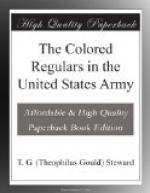the road and cheered lustily. About an hour
later, musketry fire and the occasional discharge
of a Hotchkiss gun could be plainly heard towards
Santiago. About three-quarters of an hour later
we received orders to march. By mistake, the wrong
trail was taken, and after marching fourteen hours
we returned to our camp of the previous night,
all fagged out. A great many men of the
brigade were overcome with heat during this long,
tiresome and fruitless ramble. I cannot say
how many of these were of the 25th Infantry, but in
my own company (B) there was not a man out of
the ranks when the camp was reached. (I have
called the above-mentioned place “Siboney.”
There is probably some other name for it, as
the Cubans have one for every hamlet. It is not
far from Siboney, and not knowing the name, have
called it Siboney.)
On the morning of the 25th we got rations from the transport and all enjoyed a hearty breakfast. At 1 P.M. we broke camp and marched to Sevilla, about six miles. Here we remained until the morning of the 27th, part of the regiment being out on picket duty. June 27th, the regiment marched three miles towards Santiago and bivouacked on the banks of a small creek. Bathing was forbidden, as the creek was the only water supply for the army. The troops remained at this place until the afternoon of June 30th. The camp was in the valley of the creek, the ground is low and flat, and with the heavy rainfall every one was uncomfortable. Rations had to be brought from Siboney over a trail and did not arrive regularly.
About 1 o’clock in the afternoon on the 30th, the officers of the regiment were assembled at headquarters and were notified that there would be an attack on the Spanish position the next morning. About 4 o’clock the regiment started for its position, arriving after 10 o’clock, having covered a distance of less than three miles. The route was over an excuse for a road, but was crowded with some of the troops of almost every organization of the army, causing numberless halts, but worse than all, breaking the much-needed rest of the troops. On one part of this route I heard men asking, “What regiment is this?” and heard various responses, as follows: “The W.W.W.’s, the 1st Cavalry, the 4th Infantry, the 10th Cavalry,” etc. Some one asked, “What are the W.W.W.’s?” and some one replied, “Wood’s Weary Walkers.” I do not know who is responsible for that condition of affairs. Had we had an enterprising enemy in our front, disaster certainly would have followed. Here were a number of organizations scattered along a narrow, muddy trail, at the mercy of an active foe. All this was only three or four miles from the Spanish works. The men were cheerful, and few if any realized that there might be danger.
Most of the men were up and moving about before daylight the next morning. Shortly after, the regiment started in the direction of El Caney. At 9 A.M. we halted in a mango grove




